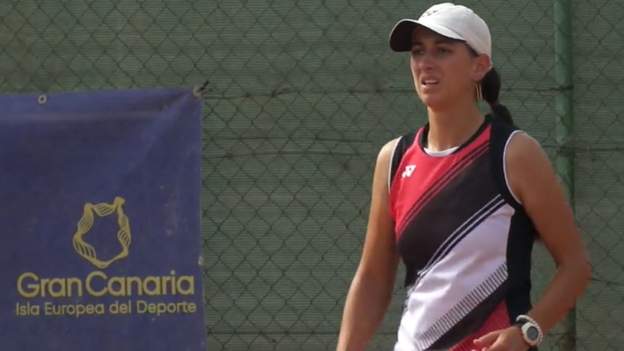
As the top players in women's tennis gather in Fort Worth for next week's WTA Finals - with a total of $5m in prize money at stake - life is very different at the other end of the world rakings.
Algeria's Ines Ibbou plays on the International Tennis Federation (ITF) tour, where the rewards are well below those on offer at the Grand Slams.
For the 23-year-old, who is ranked 502 in the world, every expenditure needs to be tightly controlled.
"A week [on tour] can quickly mean 1500 to 2000 euros ($1490-1990) of spending - just for me, without a coach or anyone else," Ibbou told BBC Sport Africa.
"Flight tickets are very very expensive at the moment. Tickets can be up to 400-500 euros just for a single flight.
"Then you add the accommodation, food, extras, strings - we have to pay for everything.
"The top 10 earn really good money, but you really only start to make a living from tennis when you reach the top 200. Ranked above 200, you barely manage to cover your costs.
"My target is really to reach the highest level, to be among the 200 best players in the world. If I reach this point, I will be able to play Grand Slams. But to get there, I need to manage the financial part."
The challenges which Ibbou, who won her first professional title at the age of 14, faces were highlighted at a tournament in the Canary Islands in August.
She would have won $60,000 in prize money if she had triumphed - compared to the $57,500 and $80,000 which first-round losers get at Wimbledon and the US Open respectively.
"It's impossible to make a living in tournaments like these," Ibbou said after her second-round exit.
"Just to come [to the Canary Islands], I made a 48-hour trip and tried to buy the cheapest flight ticket.
"It's a small hotel room I am sharing with another player - we actually played against each other. When you share a room, you [only] pay half of it so it's good for us."
Top-level players have a host of racquets provided by sponsors, often switching mid-match when preparing to return serve and occasionally breaking them when things do not go their way.
Ibbou, however, does not have such luxuries - with just four in her kitbag.
"I can't afford to change them for each tournament, and I think I've owned these for two years now," she said.
Ibbou has also relied on the kindness of strangers to make ends meet.
"I played in Germany in a tournament in Horb. It's a tiny village in the middle of nowhere, where a nice lady who I want to thank hosted me for three to four days at her place.
"She opened her doors, fed me, it was really nice. But it doesn't happen a lot."
Battling inequality and visa complications
Ibbou is Africa's representative on the ITF players' panel, and hopes to help find solutions to other problems faced players from the continent.
"I think for every African, male or female, it's really complicated because there is a structural inequality," she said.
"For instance, if you are Senegalese, Namibian or from any other African country, you have to travel to play because there are no tournaments in our countries.
"But when you are European, French or Spanish for example, in one year you can have a dozen tournaments at home. You don't need to travel or to buy a plane ticket."
African players often encounter visa issues when travelling to tournaments, which Ibbou says can be "complicated".
"For example, when I am playing a tournament in France and I need to go to Turkey or Thailand, you need to have a residence in the country [to get a visa]," she added.
"When I am in France, I am supposed to live there to be able to get a visa - but I don't have a residence in France which means I am supposed to go back to Algeria to get a visa, which can take a long time to process.
"I can wait for an answer for two or three weeks. Sometimes people got involved to help me get a visa but it was always a hassle or very last-minute. It's hard for me to plan a schedule for the whole year."
Amine Ben Makhlouf, the ITF regional officer for Africa, admits aspiring players from the continent have to contend with extra challenges.
"There are two main problems in Africa. The logistics are very difficult for players to travel around Africa and from Africa to Europe," he told BBC Sport Africa.
"For an African players to perform at a high level they need visas and this takes two to three months of his yearly competition programme."
Meanwhile, African federations do not have the requisite funds to support their players - with around $150,000 needed per player per year to sustain a full programme, including training and competition.
"Apart from Ons Jabeur, there aren't really any African players at the top, top level," Ibbou said, with the Tunisian set to take part in the WTA Finals for the first time.
"Our federations don't have the funds of other federations. If you take the French federation, they don't have the same budget the Senegalese one has. So, it's really complicated.
"I am trying to do my best to see an evolution in the African tennis but it's complicated to be heard."















 Phone: (800) 737. 6040
Phone: (800) 737. 6040 Fax: (800) 825 5558
Fax: (800) 825 5558 Website:
Website:  Email:
Email: 






